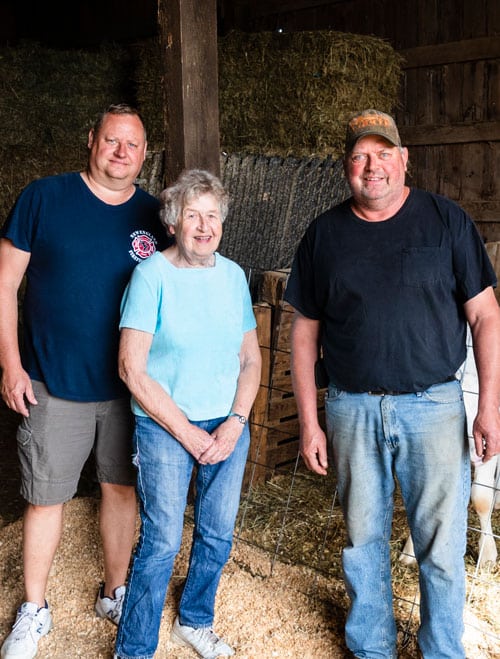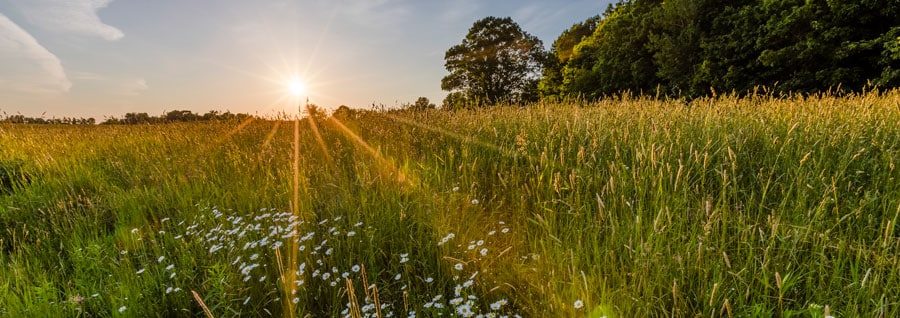Written by David Johnson
Photographed by Jerry Monkman
The iconic dairy farm in Greenland, passed down for generations since the 19th century, conserved forever.
 There’s history. There’s heritage. And there’s Great Bay Farm in Greenland, which embodies all of it.
There’s history. There’s heritage. And there’s Great Bay Farm in Greenland, which embodies all of it.
A family-owned farm that has been passed down generation to generation since the 1800s, Great Bay Farm is as iconic as it gets. One of the few remaining working dairy farms in the Seacoast, the sprawling property is as rich in cultural and community cachet as it is in conservation value – and that’s saying something as both are colossal in their quantity.
It’s late morning in Greenland. Intermittent snow patches dot Great Bay Farm. Mainly it’s just petrified mud tracks and slush, the signposts of a winter that has traded precipitation for icebox temps.
Two generations of Smiths circle around: Cynthia (the matriarch) and two of her sons, Allen and Steve. There’s a lot of character and personality at play here, and the Smiths are quick to crack jokes laced with their vintage acerbic wit. They’re New England farmers through and through.
And those values, hewn into their DNA for six generations, are what led them to this point: the decision to conserve their legendary property for all time.
It all started in 1899. Originally owned as a summer residence by a doctor from Boston, the property was purchased by Cynthia’s great-grandfather, who moved his modest cow-milking operation from Pittsfield, literally marching his herd down the turn-of-the-century New Hampshire back-roads to Greenland.
What awaited these sojourners was a one-story house sitting on a vast property just a stone’s toss from Great Bay. (That house would eventually get jacked up and a new first floor slid under the original first floor, creating an idiosyncratic Jenga-like two-story farmhouse, which exists today.)
And that’s how Great Bay Farm was born: 15 dairy cows producing local milk and an apple orchard producing apples sold to Frank Jones Brewery to make hard cider. The next 100+ years saw the farm expand its herd and transform into a full-fledged milking operation: and one of the few dairy farms to remain standing in the region. Because, let’s face it, being a dairy farmer is not the easiest way to make a living. Just ask Allen Smith.
“What’s the challenge of the day?” he says. “I was an electrician this morning, then I was a plumber, and then I had to weld something. The other day was bitter cold, so I went inside to do paperwork. I’d toss wood in the stove, do paperwork, toss more wood in the stove, do more paperwork, and so on.”
One of the main reasons so few farms remain in the region is the unyielding economic pressure that comes with the dairy industry.
“Costs keep going up and the price of milk has pretty much been stagnant for 40 years,” Allen says. “You have to creatively think of ways to save a buck or two here or there.”
Recently, Allen transitioned the farm from strictly a milking operation to a hybrid dairy and beef operation. Four years ago, he sold his main dairy herd and began to raise Holsteins crossed with beef breeds like Herefords and Angus. Milking continues at Great Bay Farm however, generating milk primarily for local specialty artisan cheese shops.
But beyond its agricultural (and nutritional!) value, Great Bay Farm offers even more when it comes to conservation and cultural resources, and this is why its forever preservation with a SELT conservation easement represents an incredible opportunity. In addition to the 154 acres of their own land, the Smith family also manages an additional 235 acres of productive fields in the surrounding community, many of which are owned by New Hampshire Fish and Game and managed for wildlife habitat.
Add to that, Great Bay Farm connects to more than 1,740 acres of existing protected land, including the nearby Great Bay National Wildlife Refuge.
“Great Bay Farm features an incredible array of conservation benefits,” says Jeremy Lougee, Conservation Project Manager and Farmland Coordinator for SELT. “Besides the idyllic fields with their backdrop to Great Bay, the farm sits on prime agricultural and forest soils, provides critical wildlife habitat for
migratory waterfowl and native species, and helps to protect the public water supply for Pease Tradeport and the Town of Greenland.”
With its proximity to Portsmouth, Interstate 95, and commuter access to the metro-Boston and Portland employment centers, Great Bay Farm is highly sought after for its development potential. In fact, a conceptual development plan in 2020 showed the potential to build 79 house lots or 168 units of age-restricted housing on this property, as allowed under the existing zoning in Greenland. This is especially concerning given the closeness to Great Bay and the Piscataqua/Salmon Falls watershed, which the US Forest Service has identified as the third most threatened watershed in the nation due to projected increases in housing density.
“There’s a misconception sometimes about farms, that they’re adding too much waste into nearby water resources,” Jeremy says. “But when you step back and look at this property, with its forested buffers along waterways and careful management of their waste, and instead, picture this land filled with houses and pavement, fertilized lawns, vehicles dripping oil, and public sewers catching all that waste – well, all of that could actually be much worse for the long-term health of Great Bay.”
And then you have the intangible community values of the farm. As a stalwart piece of Seacoast civic culture, Great Bay Farm is adored as a destination for a multitude of audiences. It’s also worth mentioning that both Steve and Allen Smith have served as superintendents of Stratham Fair, a destination for residents from the Seacoast and beyond. People like to see cows and to interact with the hardworking farmers who put food on their table.
“Almost every kid in town used to come here on a tour with the school,” Allen says. “Twice a year, vet tech students come over for practicums, checking temperatures, listening for heartbeats, you know, actually seeing what a cow looks like in person!”
“There’s not much of that around,” Steve adds. “Where else are they going to do it?”
And he’s right. There’s not much of that around. Farms have blinked out of existence in New Hampshire at an alarming rate. Since 1925, the state has lost over 90% of its farmland. Great Bay Farm represents just one of four commercial dairy farms remaining in Rockingham County.
“Protecting Great Bay Farm would help to secure prime farmland necessary for local food production in one of the state’s most rapidly developing regions,” Jeremy says. “The importance of maintaining some of our landscape for agricultural production cannot be overstated.”
Allen puts it a slightly different way: “If you want to have your sliced cheese come from California, go for it.”

